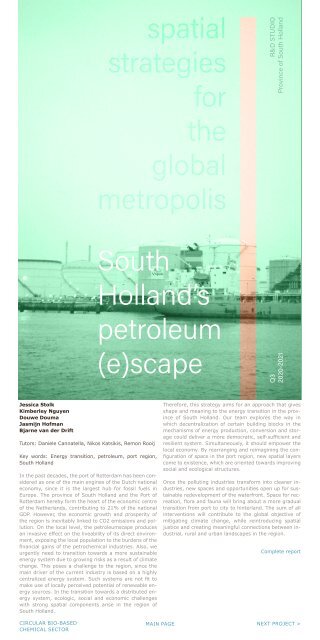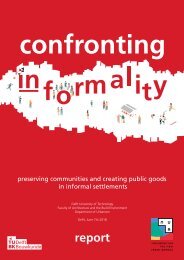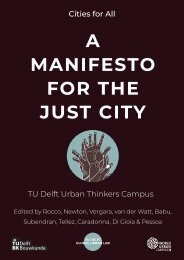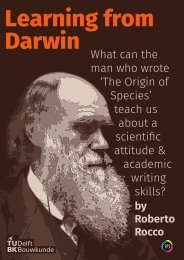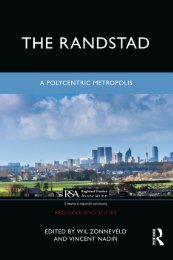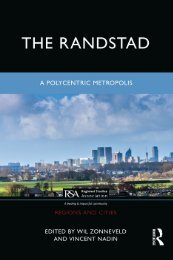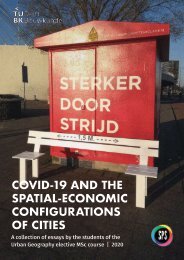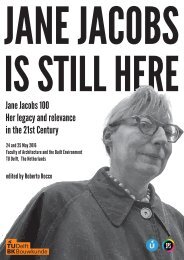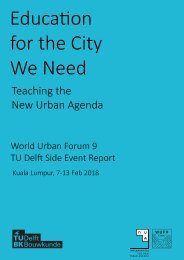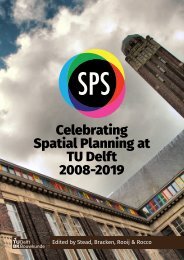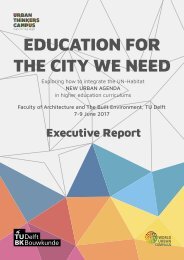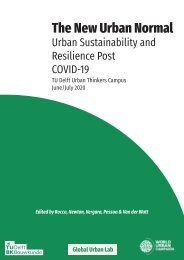Circular Southern Holland, an Online Exhibition
Online exhibition R&D studio Spatial Strategies for the Global Metropolis (AR2U086 & AR2U088), part of MSc Urbanism, Delft University of Technology, organised by Verena Balz and Qu Lei. We proudly present results of the Research & Design studio Spatial Strategies for the Global Metropolis, part of the MSc Architecture, Urbanism and Building Sciences/Track Urbanism programme at Delft University of Technology in an online exhibition. The thematic focus of the 2020-2021 round of the studio was informed by an ambitious policy agenda that the Province of South Holland has set out: aligned with objectives of the Dutch national government, it intends to host a 100% circular economy by 2050. 19 groups of students have analysed spatial and institutional development in Southern Holland and have designed visions and development strategies that lead towards a circular construction- and demolition sector, a circular agri-food sector, and a circular bio-based chemical sector in the region. In conjunction the projects presented in this exhibition explore the spatiality of a circular economy and seek to inspire spatial planning in this way. In the exhibition each student groups’ project is represented by an executive summary, which gives key information on the project and main recommendations on how to foster a circular economy in Southern Holland, and the title page of the group’s project report. Visitors who want to gain a deeper insight into projects can access the actual report in the TU Delft education repository.
Online exhibition R&D studio Spatial Strategies for the Global Metropolis (AR2U086 & AR2U088), part of MSc Urbanism, Delft University of Technology, organised by Verena Balz and Qu Lei.
We proudly present results of the Research & Design studio Spatial Strategies for the Global Metropolis, part of the MSc Architecture, Urbanism and Building Sciences/Track Urbanism programme at Delft University of Technology in an online exhibition.
The thematic focus of the 2020-2021 round of the studio was informed by an ambitious policy agenda that the Province of South Holland has set out: aligned with objectives of the Dutch national government, it intends to host a 100% circular economy by 2050. 19 groups of students have analysed spatial and institutional development in Southern Holland and have designed visions and development strategies that lead towards a circular construction- and demolition sector, a circular agri-food sector, and a circular bio-based chemical sector in the region. In conjunction the projects presented in this exhibition explore the spatiality of a circular economy and seek to inspire spatial planning in this way.
In the exhibition each student groups’ project is represented by an executive summary, which gives key information on the project and main recommendations on how to foster a circular economy in Southern Holland, and the title page of the group’s project report. Visitors who want to gain a deeper insight into projects can access the actual report in the TU Delft education repository.
Create successful ePaper yourself
Turn your PDF publications into a flip-book with our unique Google optimized e-Paper software.
spatial<br />
strategies<br />
for<br />
R&D STUDIO<br />
Province of South <strong>Holl<strong>an</strong>d</strong><br />
the<br />
global<br />
metropolis<br />
South<br />
<strong>Holl<strong>an</strong>d</strong>’s<br />
petroleum<br />
(e)scape<br />
Q3<br />
2020-2021<br />
1<br />
Jessica Stolk<br />
Kimberley Nguyen<br />
Douwe Douma<br />
Jasmijn Hofm<strong>an</strong><br />
Bjarne v<strong>an</strong> der Drift<br />
Tutors: D<strong>an</strong>iele C<strong>an</strong>natella, Nikos Katsikis, Remon Rooij<br />
Key words: Energy tr<strong>an</strong>sition, petroleum, port region,<br />
South <strong>Holl<strong>an</strong>d</strong><br />
In the past decades, the port of Rotterdam has been considered<br />
as one of the main engines of the Dutch national<br />
economy, since it is the largest hub for fossil fuels in<br />
Europe. The province of South <strong>Holl<strong>an</strong>d</strong> <strong>an</strong>d the Port of<br />
Rotterdam hereby form the heart of the economic centre<br />
of the Netherl<strong>an</strong>ds, contributing to 21% of the national<br />
GDP. However, the economic growth <strong>an</strong>d prosperity of<br />
the region is inevitably linked to CO2 emissions <strong>an</strong>d pollution.<br />
On the local level, the petroleumscape produces<br />
<strong>an</strong> invasive effect on the liveability of its direct environment,<br />
exposing the local population to the burdens of the<br />
fin<strong>an</strong>cial gains of the petrochemical industries. Also, we<br />
urgently need to tr<strong>an</strong>sition towards a more sustainable<br />
energy system due to growing risks as a result of climate<br />
ch<strong>an</strong>ge. This poses a challenge to the region, since the<br />
main driver of the current industry is based on a highly<br />
centralized energy system. Such systems are not fit to<br />
make use of locally perceived potential of renewable energy<br />
sources. In the tr<strong>an</strong>sition towards a distributed energy<br />
system, ecologic, social <strong>an</strong>d economic challenges<br />
with strong spatial components arise in the region of<br />
South <strong>Holl<strong>an</strong>d</strong>.<br />
Therefore, this strategy aims for <strong>an</strong> approach that gives<br />
shape <strong>an</strong>d me<strong>an</strong>ing to the energy tr<strong>an</strong>sition in the province<br />
of South <strong>Holl<strong>an</strong>d</strong>. Our team explores the way in<br />
which decentralization of certain building blocks in the<br />
mech<strong>an</strong>isms of energy production, conversion <strong>an</strong>d storage<br />
could deliver a more democratic, self-sufficient <strong>an</strong>d<br />
resilient system. Simult<strong>an</strong>eously, it should empower the<br />
local economy. By rearr<strong>an</strong>ging <strong>an</strong>d reimagining the configuration<br />
of space in the port region, new spatial layers<br />
come to existence, which are oriented towards improving<br />
social <strong>an</strong>d ecological structures.<br />
Once the polluting industries tr<strong>an</strong>sform into cle<strong>an</strong>er industries,<br />
new spaces <strong>an</strong>d opportunities open up for sustainable<br />
redevelopment of the waterfront. Space for recreation,<br />
flora <strong>an</strong>d fauna will bring about a more gradual<br />
tr<strong>an</strong>sition from port to city to hinterl<strong>an</strong>d. The sum of all<br />
interventions will contribute to the global objective of<br />
mitigating climate ch<strong>an</strong>ge, while reintroducing spatial<br />
justice <strong>an</strong>d creating me<strong>an</strong>ingful connections between industrial,<br />
rural <strong>an</strong>d urb<strong>an</strong> l<strong>an</strong>dscapes in the region.<br />
Complete report<br />
CIRCULAR BIO-BASED<br />
CHEMICAL SECTOR<br />
MAIN PAGE


